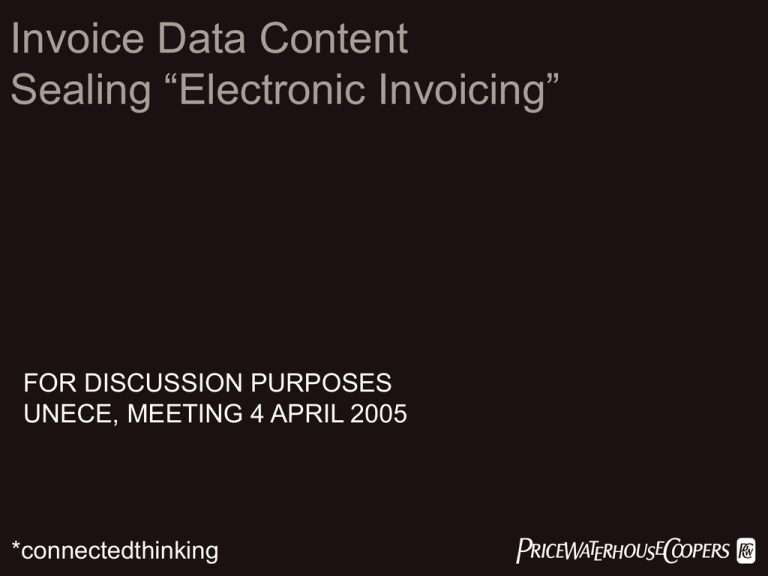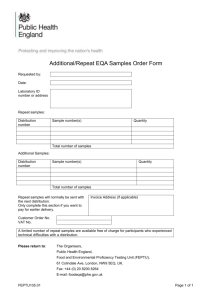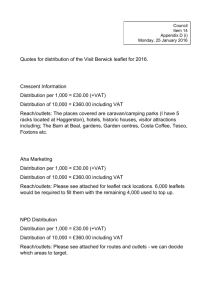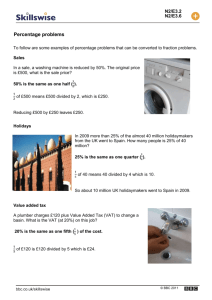
Invoice Data Content
Sealing “Electronic Invoicing”
FOR DISCUSSION PURPOSES
UNECE, MEETING 4 APRIL 2005
*connectedthinking
PwC
INVOICE DATA
CONTENT
*connectedthinking
PwC
Mandatory invoice details in accordance with the Directive’s list (1)
• Date of issue of the invoice (25)
Greece: In case of domestic transactions
• A sequential number, based on one or more series,
Lithuania: In case of domestic transactions where
the customer has a Lithuanian VAT number
which uniquely identifies the invoice (25)
• VAT identification number of supplier (25)
Portugal and Slovak Republic: Not specified
• VAT identification number of customer:
Spain: In case of domestic transactions carried out
by Spanish VAT established taxpayers
•
in case he is liable to pay the VAT due (25)
•
in other cases (8)
Austria: In case of services supplied according to
art. 28b, C, D, E, F of the Sixth Directive
Belgium: In case the customer uses his Belgian
VAT number, the VAT number has always to be
mentioned if the supplier is established in Belgium
and it concerns a local supply
Czech Republic: If the supply is rendered to a
taxable person
• Full name and address of supplier (25)
• Full name and address of customer (25)
• Quantity and nature of the goods supplied or the
extent and nature of the services rendered (25)
• Date of supply of goods or rendering of services or
date on which payment of account was made if
different from invoice date (25)
Between brackets is indicated the number of EU Member States requiring this invoice detail
© 2005 PricewaterhouseCoopers
Page 3
FOR DISCUSSION PURPOSES ONLY
Mandatory invoice details in accordance with the Directive’s list (2)
• Price per unit (23)
• Any discounts or rebates not included in the
unit price (23)
• Taxable amount per rate or exemption (25)
• VAT rate applied (25)
• VAT amount payable in the national currency (25)
• Where an exemption is involved or where the
customer is liable to pay VAT, reference to
•
the provision of the 6th Directive (18)
•
national legislation (25)
•
any other indication (18)
• Where the person liable to pay the tax is a tax
representative; the identification number for
VAT purposes, together with full name and
address (13)
Between brackets is indicated the number of EU Member States requiring this invoice detail
© 2005 PricewaterhouseCoopers
Page 4
FOR DISCUSSION PURPOSES ONLY
Mandatory invoice details violating the EU Directive (1)
• Belgium: capacity of VAT representative
• Greece: reference to delivery note (if applicable)
• Hungary:
•
Statistical number of the product if reduced rate or VAT exempt
•
Method of payment and due date for the payment
•
Number of copy and total number of copies
•
Page number and total number of pages
•
Total taxable amount
•
VAT amount per VAT rate
•
Total amount inclusive VAT
© 2005 PricewaterhouseCoopers
Page 5
FOR DISCUSSION PURPOSES ONLY
Mandatory invoice details violating the EU Directive (2)
• Italy:
•
Capacity of the VAT representative
•
Reference to transport documents (if applicable) in case of deferred invoices
•
Arm’s length value of the product in case of discounts or rebates
•
VAT amount per VAT rate
• Malta: the type of supply by reference to a predefined category
• Poland:
•
Statistical number of the product if reduced rate or VAT exempt
•
Total amount due in figures and words
• Slovak Republic: reference to the Member State of arrival for intra-Community supplies of goods/services
© 2005 PricewaterhouseCoopers
Page 6
FOR DISCUSSION PURPOSES ONLY
Mandatory invoice details violating the EU Directive (3)
• Where an exemption is involved or where the customer is liable to pay VAT, some Member States do still not
accept a reference to the appropriate provision of the 6th Directive or any other indication:
•
Greece
•
Hungary
•
Italy
•
Latvia
•
Lithuania
•
Portugal
•
Slovenia
• Specific language requirements: Hungary
• Specific currency requirements: Czech Republic and Hungary
- Italics = those countries who have other infringements as well
© 2005 PricewaterhouseCoopers
Page 7
FOR DISCUSSION PURPOSES ONLY
Sealing
Electronic Invoicing
*connectedthinking
PwC
E-invoicing – Is there a compliant model for VAT?
Acceptance by the customer
•
No licenses/authorisations required
Authenticity of origin and integrity of content through
•
Use of EDI
•
Advanced electronic signature
•
Other electronic means
Applicable for issuing the e-invoices by supplier,
customer (SBI) or third party (outsourcing)
© 2005 PricewaterhouseCoopers
Page 9
FOR DISCUSSION PURPOSES ONLY
Use of EDI
VAT possibility I
EDI
Advanced electronic signatures
Other electronic means
• Recommendation of the Commission 19 October 1994:
• Electronic transfer
• from computer to computer
• using an agreed standard to structure the message
• in a computer readable format
• that can be processed automatically unambiguously
• Agreement relating to the exchange provides for the use of procedures
guaranteeing authenticity of the origin and integrity of the data
• Option: creation of summary statement on paper
“VAT” EDI has its own broadly applicable definition
© 2005 PricewaterhouseCoopers
Page 10
FOR DISCUSSION PURPOSES ONLY
VAT possibility II –
Advanced electronic signatures
Use of EDI
Advanced electronic signatures
Other electronic means
• Art. 2 (2) of the Directive on electronic signatures
•
•
•
•
Connected to the signer in a unique way
Possibility to identify the signer
Realisation under exclusive control of the signer
Possibility to trace every change afterwards
Electronic
signature
Advanced
electronic signature
• Options:
• Qualified certificate (Art. 2(6))
• Secure-signature creation device (Art. 2(10))
© 2005 PricewaterhouseCoopers
Qualified
signature
Page 11
FOR DISCUSSION PURPOSES ONLY
VAT possibility III –
Other electronic means
Use of EDI
Advanced electronic signatures
Other electronic means
Buy Side
Sell Side
Collection
Server
ERP
System
Translation
Engine
Electronic
Bill
Presentment
Server
Invoice
Risk of invoicing twice: paper & electronic !
© 2005 PricewaterhouseCoopers
Page 12
FOR DISCUSSION PURPOSES ONLY
Use of EDI
Summary e-invoicing possibilities
Advanced electronic signatures
Other electronic means
A
T
B
E
C
Y
C
Z
D
K
E
E
FI
F
R
D
E
E
L
H
U
I
E
I
T
L
V
L
T
L
U
M
T
P
L
P
T
S
K
S
L
E
S
S
E
N
L
U
K
1
2
3
*
N/
A
4
1.
Acceptance of EDI to send e-invoices
2.
Obligation to issue paper summary document
3.
Obligation to use a qualified certificate and a secure signature-creation device
4.
Acceptance of ‘other electronic means’ to send e-invoices
* Time stamping is required as well
Status 15 February 2005 – www.globalvatonline.com
© 2005 PricewaterhouseCoopers
Page 13
FOR DISCUSSION PURPOSES ONLY
Categorisation Member States
e-invoicing
• Green countries:
• Belgium, Denmark, Estonia, Finland, Ireland, Sweden, the
Netherlands and the UK
• Red countries:
• Countries that do not comply with the 6th Directive: Malta,
Poland and Slovenia (no acceptance of EDI)
• Other ‘bad examples’: Czech Republic, Germany, Greece,
Italy, Lithuania and Portugal
© 2005 PricewaterhouseCoopers
Page 14
FOR DISCUSSION PURPOSES ONLY
Sources:
•www.globalvatonline.com
•PricewaterhouseCoopers << A Guide To VAT in the EU of 25 Countries >>
•PricewaterhouseCoopers << E-invoicing and E-archiving >>
© 2005 PricewaterhouseCoopers. All rights reserved. PricewaterhouseCoopers refers to the network
of member firms of PricewaterhouseCoopers International Limited, each of which is a separate and
independent legal entity. *connectedthinking is a trademark of PricewaterhouseCoopers.
*connectedthinking
PwC







